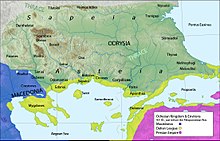Cicones
Later Ciconian reinforcements arrive and attack the invading Achaeans, killing so many of them that Odysseus and his men are forced to flee in their ships.
I then said that we had better make off at once, but my men very foolishly would not obey me, so they stayed there drinking much wine and killing great numbers of sheep and oxen on the sea shore.
These were more in number, and stronger, and they were more skilled in the art of war, for they could fight, either from chariots or on foot as the occasion served; in the morning, therefore, they came as thick as leaves and bloom in summer, and the hand of heaven was against us, so that we were hard pressed.
[5] Orpheus, the Thracian lyre-player who sought his lover Eurydice in the underworld, was said to have been torn to pieces by Ciconian women after he rejected their advances, subsequently being reincarnated as a swan,[6] or, according to Ovid, his disembodied head floating on the sea until it came to rest on the island of Lesbos, where it continued to speak, uttering prophecies.
Non mythical instances of them occur in Herodotus (5th century BC) as he writes of their land that Xerxes' army passed by.
